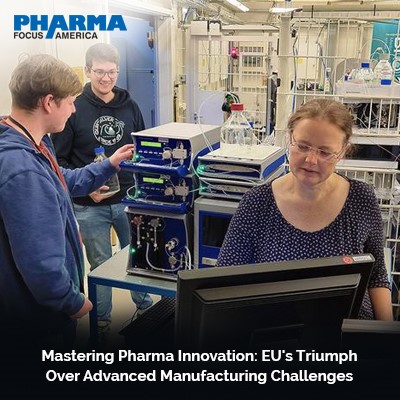Mastering Pharma Innovation: EU's Triumph over Advanced Manufacturing Challenges
Kate Williamson, Editorial Team, Pharma Focus America
In the dynamic realm of pharmaceuticals, the European Union (EU) has excelled in overcoming advanced manufacturing hurdles, showcasing prowess in innovation and collaboration. This article explores the EU's role in navigating challenges, key initiatives driving innovation, success stories, regulatory frameworks, collaborative efforts, future trends, and case studies of pioneering pharmaceutical manufacturers in the EU.
Introduction:
In the fast-paced world of pharmaceuticals, innovation is key to success. The European Union (EU) has emerged as a frontrunner in the realm of advanced manufacturing challenges, displaying a triumph of expertise and ingenuity. Through a combination of cutting-edge technology, regulatory initiatives, and collaborative partnerships, the EU has managed to master the art of pharma innovation.
Challenges in Advanced Manufacturing for Pharmaceuticals
The pharmaceutical industry faces numerous challenges in advanced manufacturing. These challenges include stringent regulations, complex supply chains, and the need to meet ever-evolving market demands. Manufacturing pharmaceuticals involves high precision and quality control to ensure the safety and efficacy of medicines. Additionally, the industry must adapt to emerging technologies and new therapeutic approaches, such as personalized medicine. These challenges require innovative solutions that can streamline manufacturing processes while maintaining compliance with regulations.
The Role of the European Union in Overcoming These Challenges
The European Union has played a pivotal role in overcoming advanced manufacturing challenges in the pharmaceutical industry. With a focus on innovation and collaboration, the EU has created an ecosystem that fosters the development and implementation of cutting-edge manufacturing technologies. This has enabled European pharma companies to stay ahead of the curve and drive advancements in the industry. By leveraging its regulatory framework, the EU ensures that manufacturing processes meet the highest standards of quality and safety.
Key Initiatives by the European Union to Foster Innovation in Advanced Manufacturing
The EU has implemented several key initiatives to foster innovation in advanced manufacturing. One such initiative is the European Medicines Agency's (EMA) Innovation Task Force, which aims to support the development and adoption of innovative manufacturing technologies. The EMA provides guidance and regulatory support to pharmaceutical companies, helping them navigate the complexities of advanced manufacturing. Additionally, the EU has invested in research and development programs, such as Horizon Europe, to drive innovation in the pharmaceutical industry. These initiatives encourage collaboration between academia, industry, and regulatory bodies, fostering a culture of innovation.
Success Stories of Advanced Manufacturing in the EU Pharmaceutical Industry
The EU has witnessed numerous success stories in advanced manufacturing within the pharmaceutical industry. One notable example is the use of automation and robotics in manufacturing processes. By automating repetitive tasks, European pharma companies have increased efficiency, reduced costs, and improved product quality. Another success story lies in the adoption of digitalization and data analytics. Through the use of advanced analytics and artificial intelligence, companies can optimize manufacturing processes, predict maintenance needs, and ensure consistent product quality. These success stories highlight the EU's commitment to embracing emerging technologies and driving innovation in advanced manufacturing.
Regulatory Frameworks and Standards for Advanced Manufacturing in the EU
The EU has established robust regulatory frameworks and standards for advanced manufacturing in the pharmaceutical industry. These frameworks ensure that manufacturing processes adhere to stringent quality and safety standards. The EU's Good Manufacturing Practice (GMP) guidelines provide a comprehensive framework for pharmaceutical manufacturing, covering areas such as facility design, equipment qualification, and process validation. Additionally, the EU has implemented regulations to address specific challenges, such as the serialization of pharmaceutical products to combat counterfeit medicines. These regulatory frameworks and standards give confidence to patients and healthcare professionals that medicines manufactured in the EU meet the highest quality standards.
Collaboration and Partnerships in Advancing Pharmaceutical Innovation in the EU
Collaboration and partnerships have played a crucial role in advancing pharmaceutical innovation in the EU. The EU encourages collaboration between industry stakeholders, research institutions, and regulatory bodies to drive innovation. For example, the Innovative Medicines Initiative (IMI) brings together pharmaceutical companies, academic institutions, and patient organizations to accelerate the development of innovative medicines. Through these collaborations, stakeholders can share knowledge and resources, pool expertise, and address common challenges. This collaborative approach fosters a culture of innovation and accelerates the development and adoption of advanced manufacturing technologies.
Future Trends and Opportunities in Advanced Manufacturing for Pharmaceuticals in the EU
The future of advanced manufacturing in the EU pharmaceutical industry looks promising, with several trends and opportunities on the horizon. Personalized medicine, enabled by advances in genomics and digital technologies, is expected to revolutionize the way medicines are manufactured and administered. 3D printing of pharmaceuticals is another emerging trend that could enable the production of personalized dosage forms tailored to individual patients. Furthermore, the adoption of continuous manufacturing, which replaces traditional batch processes with continuous production, has the potential to increase efficiency and reduce costs. These trends present exciting opportunities for EU pharma companies to further enhance patient outcomes and drive innovation.
Case Studies of Innovative Pharmaceutical Manufacturing Companies in the EU
Several innovative pharmaceutical manufacturing companies in the EU have made significant contributions to advanced manufacturing. One such case study is Novartis, which has embraced digitalization and automation in its manufacturing processes. By leveraging advanced analytics and robotics, Novartis has increased operational efficiency, reduced time-to-market, and improved product quality. Another example is GlaxoSmithKline (GSK), which has implemented continuous manufacturing technologies to streamline production and enhance flexibility. These case studies demonstrate how EU pharmaceutical companies are leveraging advanced manufacturing techniques to drive innovation and remain competitive in the global market.
Conclusion: The EU's Journey towards Mastering Pharmaceutical Innovation
The European Union has successfully overcome advanced manufacturing challenges in the pharmaceutical industry through its commitment to innovation, collaboration, and regulatory excellence. By embracing automation, digitalization, and personalized medicine, the EU has paved the way for groundbreaking innovations that deliver enhanced patient outcomes. Through regulatory initiatives, such as the EMA's Innovation Task Force, and collaborative partnerships, the EU has created an ecosystem that fosters the development and adoption of advanced manufacturing technologies. As the EU continues to prioritize innovation and invest in research and development, it is well-positioned to maintain its leadership in pharmaceutical excellence and shape the future of advanced manufacturing in the industry.










